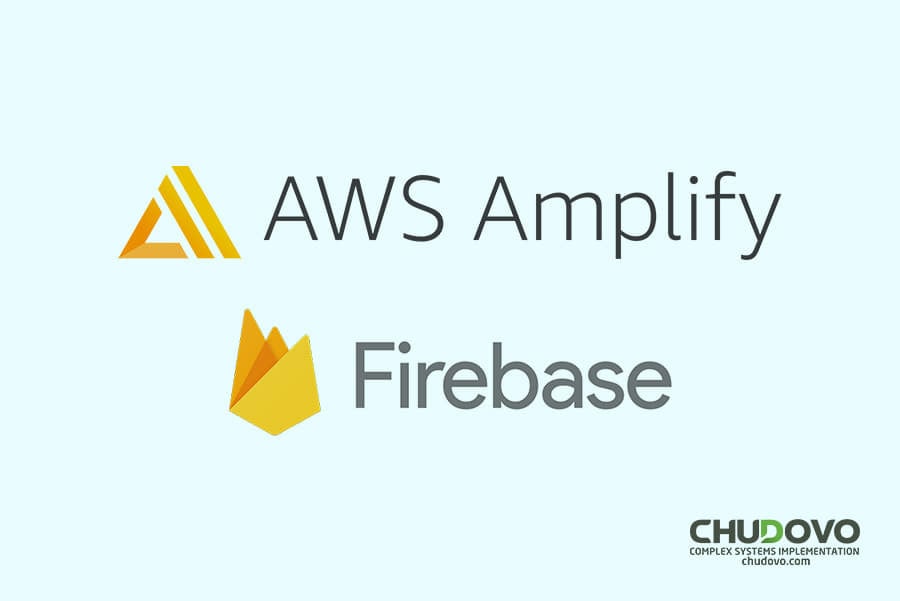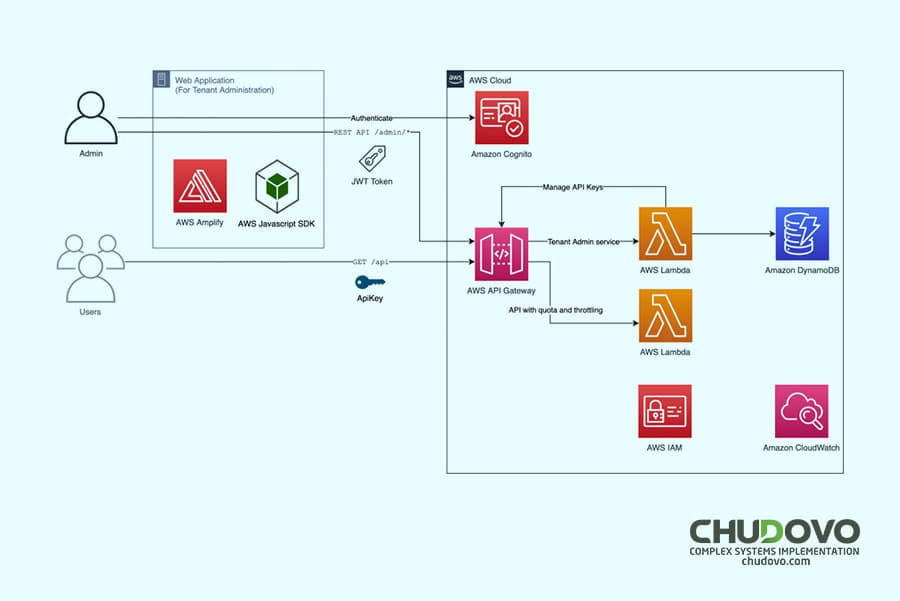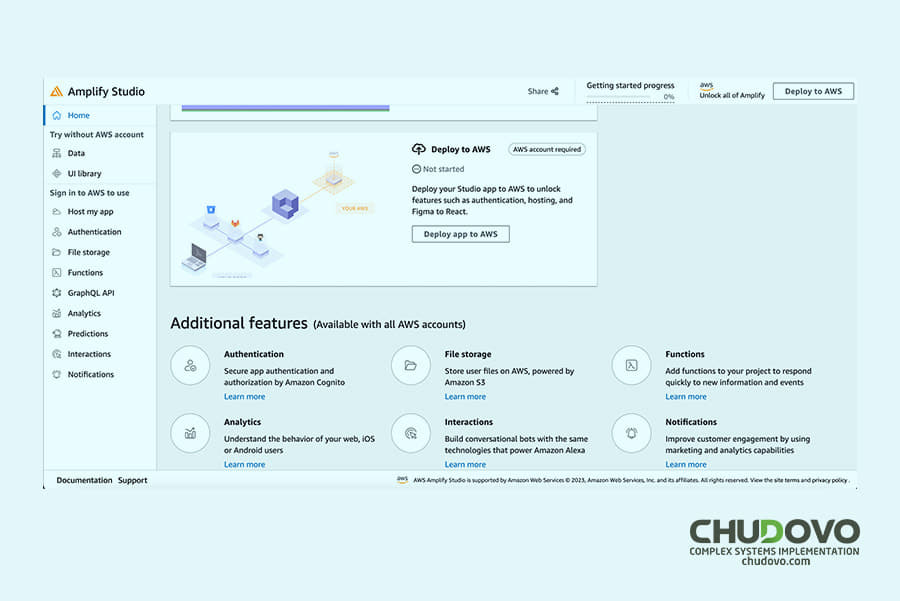Amplify or Firebase: Which One Should You Choose for Your Development Needs?
In this article, we will compare AWS Amplify and Google Firebase, two popular Backend-as-a-Service (BaaS) platforms for web and mobile application development. We will discuss the key features of both services, their pricing plans, and the benefits of using them.
We will also provide some tips and insights on developing with these services and highlight some libraries that can be used to further enhance the development process. Stay tuned for an in-depth analysis of the latest trends in BaaS and our experts’ opinion on which platform is best suited for your development needs.
Table of contents
- What is AWS Amplify?
- Key Features of AWS
- AWS Amplify Pricing
- Benefits of AWS Amplify
- Basic Principles of Amplify Libraries Development
- What is Google Firebase?
- Core Features of Firebase
- Firebase Pricing
- Benefits of Firebase
- Principles of Firebase Development
- Similarities between AWS Amplify and Google Firebase
- Backend as a Service (BaaS)
- Real-time Database
- Authentication and Authorization
- Serverless Computing
- Mobile Development
- Firebase vs Amplify – Key differences
- Conclusion
- FAQs

What is AWS Amplify?
AWS Amplify is a set of tools and services that enable developers to build scalable and secure cloud-powered applications. Amplify helps developers to accelerate their digital transformation journey and simplifies the software development process by providing an easy-to-use framework for building modern applications.
With Amplify, developers can quickly add features such as authentication, storage, APIs, and more to their web and mobile applications. This enables them to focus on building high-quality user experiences, rather than worrying about the underlying infrastructure.
Key Features of AWS
This document highlights the key features of a popular cloud computing service known as AWS. It discusses how AWS can be used for project development, AWS development, hosting, and data analytics.
AWS for Project Development
AWS provides a wide range of services that cater to the needs of project development teams. Its services include compute, storage, database, machine learning, and analytics, among others. AWS also offers a pay-as-you-go pricing model, which makes it cost-effective for small and large-scale projects.
AWS for Development
AWS offers an extensive set of tools and services for developers to build, test, and deploy their applications quickly and efficiently. These tools include AWS CodeCommit, CodeDeploy, CodePipeline, CloudFormation, and AWS Elastic Beanstalk, among others. These services enable developers to focus on building their applications rather than worrying about infrastructure management.
AWS Suited for Hosting
AWS offers a highly scalable and reliable infrastructure that is well-suited for hosting websites, web applications, and enterprise applications. AWS provides a range of hosting services, including Amazon Elastic Compute Cloud (EC2), Amazon Elastic Container Service (ECS), and AWS Lambda, among others. These services allow businesses to scale up or down their infrastructure based on their needs, ensuring optimal performance and cost efficiency.
AWS for Data Analytics
AWS offers a range of data analytics services, including Amazon Redshift, Amazon EMR, and Amazon Athena, among others. These services enable businesses to process and analyze large volumes of data quickly and efficiently. AWS also integrates with popular data analytics tools such as Tableau, Power BI, and QlikView, making it easy for businesses to extract insights from their data.
AWS Amplify Pricing
AWS Amplify is a set of tools and services that enable developers to build scalable and secure cloud-powered web and mobile applications. The platform offers a comprehensive suite of features. Here is an overview of AWS Amplify pricing:
- Free Tier
The free tier includes 1,000 build minutes per month, 5 GB of storage, and 15 GB of data transfer per month. This means that developers can experiment and test their applications without worrying about costs.
- Pay as You Go
After the free tier, AWS Amplify offers a pay-as-you-go pricing model. This means that developers only pay for what they use, with no upfront costs or minimum fees. This makes AWS Amplify a cost-effective option for developers who want to build and deploy their applications on the cloud.

Benefits of AWS Amplify
AWS Amplify is a cloud development tool that enables developers to build and deploy cloud-powered mobile and web applications quickly and efficiently. It offers a wide range of benefits that make it an attractive choice for developers. Here are some of the benefits of AWS Amplify:
- Components
AWS Amplify provides pre-built components that simplify mobile and web application development. These components are designed to speed up the development process, reduce the amount of code required to build an application, and make it easier to add new features. Some of the components available in AWS Amplify include authentication, storage, APIs, and analytics.
- Monitoring
AWS Amplify offers built-in monitoring tools that help developers track their application’s performance and identify issues quickly. The monitoring tools provide real-time metrics and logs, making it easier to troubleshoot problems and optimize application performance. Developers can use the monitoring tools to track key performance indicators (KPIs) such as response time, error rate, and user engagement. The monitoring tools also provide alerts when KPIs fall outside predefined thresholds, allowing developers to take corrective action.
- AWS Amplify Studio
AWS Amplify Studio is a visual development environment that makes it easy for developers to build cloud-powered applications. The studio offers a drag-and-drop interface that allows developers to create and deploy applications quickly and easily. With AWS Amplify Studio, developers can create cloud-powered applications without needing to write code.
- Angular Support
AWS Amplify supports Angular, one of the most popular JavaScript frameworks for building web applications. With Angular support, developers can build scalable and maintainable applications quickly and easily. AWS Amplify provides a range of Angular components, making it easy to add cloud functionality to an Angular application.
- Cloud Support
AWS Amplify is built on top of AWS, which means that it offers robust cloud support. Developers can take advantage of AWS services like Lambda, API Gateway, and DynamoDB to build powerful and scalable applications. AWS Amplify provides a range of tools and APIs that make it easy to integrate with AWS services.
- Software Development Kits (SDKs)
AWS Amplify provides SDKs for iOS, Android, and JavaScript, making it easy for developers to integrate AWS services into their applications. These SDKs provide a range of pre-built components and APIs that make it easy to add cloud functionality to an application. Developers can use the SDKs to build applications that are highly scalable and reliable, with minimal infrastructure overhead.
- Supports Multiple Platforms
AWS Amplify supports multiple platforms, including iOS, Android, React Native, and web. This makes it easy for developers to build cross-platform applications that work seamlessly across different devices. Developers can use AWS Amplify to build applications for different platforms without needing to learn new tools or languages. This reduces the custom apps development time and cost, making it easier to reach a wider audience.
- Dedicated Team Collaboration
AWS Amplify makes it easy for teams to collaborate on application development. With AWS Amplify, developers can work together on the same codebase, and the platform offers built-in tools for code reviews and version control. This reduces the time and effort required to manage code changes, making it easier to build high-quality applications.
Basic Principles of Amplify Libraries Development
Amplify Libraries Development is a set of principles that guide the development of libraries for the Amplify framework. These principles serve as a foundation for building high-quality, robust, and scalable libraries that can be used by developers to build modern web and mobile applications. Here are some of the basic principles of Amplify Libraries Development:
1. Reusability
One of the key principles of Amplify Libraries Development is reusability. Libraries should be designed and developed in such a way that they can be reused across multiple projects. This ensures that developers can easily incorporate the functionality provided by the library into their own projects without having to write the same code over and over again.
2. Modularity
Amplify Libraries should be developed in a modular fashion, with each module providing a specific set of functionality. This makes it easier for developers to understand and use the library, as they can choose which modules they want to use and ignore the rest.
3. Consistency
Consistency is another important principle of Amplify Libraries Development. Libraries should follow consistent naming conventions, coding standards, and documentation practices. This makes it easier for developers to understand and use the library, as they can quickly learn how to use it based on their experience with other libraries.
4. Scalability
Amplify Libraries should be designed and developed with scalability in mind. This means that they should be able to handle large amounts of data and traffic without slowing down or crashing. Libraries should also be designed to scale horizontally, allowing developers to add more resources as needed.
5. Security
Security is a critical aspect of Amplify Libraries Development. Libraries should be designed and developed with security in mind, with features such as authentication, encryption, and access control built in. This ensures that the library can be used safely and securely in a variety of environments.

What is Google Firebase?
Firebase is a platform provided by Google that allows front-end developers to build web and mobile applications. It offers various features such as real-time database, authentication, hosting, storage, and much more.
Firebase’s real-time database allows developers to store and synchronize data between different clients in real-time. This means that any changes made to the data are immediately reflected across all clients connected to the database.
Firebase also offers a user interface (UI) that allows developers to manage their projects without the need for complex coding. Additionally, it provides a command-line interface (CLI) that enables developers to automate tasks and speed up the development process.
Firebase also supports continuous integration (CI) and continuous deployment (CD) that help developers build, test, and deploy their applications seamlessly.
Core Features of Firebase
Firebase is a mobile and web application development platform that provides various tools and services to developers. Here are some of the core features of Firebase:
Real-time Database
Firebase Real-time Database is a cloud-hosted NoSQL database that stores data as JSON. It provides real-time synchronization and automatic data fetching between clients and server, making it easy to build collaborative applications.
Authentication
Firebase Authentication is a secure authentication system that allows users to sign in using email and password, phone number, Google, Facebook, Twitter, and other third-party providers. It also manages user sessions and provides account management features.
Cloud Firestore
Cloud Firestore is a NoSQL document database that provides real-time synchronization and automatic scaling. It supports offline data access and querying, enabling developers to build responsive applications.
Hosting
Firebase Hosting is a fast and secure web hosting service that enables developers to deploy static and dynamic content to a global CDN with a single command. It also provides custom domains, SSL certificates, and easy integration with other Firebase services.
Analytics
Firebase Analytics is a free app measurement solution that provides insights into user behavior and app performance. It allows developers to track user engagement, retention, and conversion, and provides user segmentation and event tracking features.
Performance Monitoring
Firebase Performance Monitoring provides insights into app performance and helps developers identify and fix performance issues. It supports network monitoring, traces, and custom metrics, and provides real-time alerts and dashboards.
Firebase Pricing
Firebase offers a free tier plan, a pay-as-you-go plan, and a fixed-cost plan with a set monthly fee. Here is a breakdown of Firebase’s pricing plans:
Free Tier
Firebase’s free tier plan is ideal for developers who are just starting and want to explore Firebase’s features without incurring any costs. The free tier plan includes:
- Realtime Database: 1 GB storage, 20,000 reads, 50,000 writes, 20,000 deletes per day.
- Cloud Firestore: 1 GB storage, 50,000 reads, 20,000 writes, 20,000 deletes per day.
- Authentication: Up to 10,000 monthly active users.
- Hosting: 1 GB storage and 10 GB of data transfer per month.
- Cloud Functions: 125,000 invocations, 40,000 GB-seconds, and 1000 seconds of free running time per month.
- Cloud Storage: 5 GB storage and 1 GB download per month.
Pay-as-you-go Plan
The pay-as-you-go plan allows developers to access Firebase’s features without any upfront costs. Users are only charged for the resources they use. The pay-as-you-go plan includes:
- Realtime Database: $5 per GB storage, $1 per 100,000 reads, $5 per 1 million writes, and $1 per 100,000 deletes.
- Cloud Firestore: $18 per GB storage, $0.06 per 100,000 reads, $0.18 per 100,000 writes, and $0.02 per 100,000 deletes.
- Authentication: $1 per 1000 monthly active users.
- Hosting: $0.026 per GB storage and $0.15 per GB of data transfer.
- Cloud Functions: $0.40 per million invocations, $0.0000025 per GB-second, and $0.00001667 per GB of network egress.
- Cloud Storage: $0.026 per GB storage and $0.12 per GB download.
Fixed-Cost Plan
Firebase’s fixed-cost plan offers a set monthly fee for developers who want to use Firebase’s services extensively and predictably. The fixed-cost plan includes:
- Realtime Database: $25 per month for 5 GB storage, 50,000 reads, 20,000 writes, and 20,000 deletes per day.
- Cloud Firestore: $50 per month for 50 GB storage, 50,000 reads, 20,000 writes, and 20,000 deletes per day.
- Authentication: $300 per month for up to 100,000 monthly active users.
- Hosting: $15 per month for 5 GB storage and 100 GB of data transfer per month.
- Cloud Functions: $10 per month for 2 million invocations, 400,000 GB-seconds, and 1000 seconds of free running time per month.
- Cloud Storage: $20 per month for 200 GB storage and 10 GB download per month.
Benefits of Firebase
Firebase is a Backend-as-a-Service (BaaS) platform that provides developers with a wide range of tools and services to build high-quality apps. Here are some of the benefits of using Firebase:
- Real-time database
Firebase offers a real-time database that allows developers to store and sync data in real-time. This feature is particularly useful for chat applications and other apps that require real-time updates.
- Authentication
Firebase provides a simple and secure way to authenticate users. Developers can use Firebase Authentication to sign in users with email and password, phone numbers, Google, Facebook, Twitter, and more.
- Analytics
Firebase Analytics provides developers with real-time insights into user behavior and web applications performance. Developers can use these insights to improve their app and make data-driven decisions.
- AdMob
Firebase AdMob is a mobile advertising platform that helps developers monetize their apps. Developers can use AdMob to show ads in their app and earn revenue.
- Machine learning
Firebase ML Kit provides developers with powerful machine learning capabilities, including image labeling, text recognition, and language identification. Developers can use these capabilities to add intelligent features to their mobile application.
Principles of Firebase Development
Firebase is a cloud-based mobile and mobile development platform owned by Google. It provides developers with a wide range of tools and services to build and improve their applications. Here are some principles to keep in mind when developing with Firebase:
1. Understand the Firebase Services
Before using Firebase, it is important to mastering the different services it offers. Firebase includes services such as Authentication, Realtime Database, Cloud Firestore, Hosting, Cloud Functions, and many more. Each service has its own unique features and use cases. Understanding these services will help you choose the right ones for your application.
2. Plan your Data Structure
Firebase is a NoSQL database, which means that data is stored in a non-tabular format. This allows for more flexibility in data modeling but requires careful planning of your data structure. Before building your application, you should plan out the structure of your data and how it will be stored in Firebase.
3. Optimize for Performance
Firebase provides real-time updates and synchronization of data, but it is important to optimize your code for performance. This includes minimizing the number of reads and writes to the database, as well as optimizing your queries.
4. Secure Your Data
Firebase provides built-in security features such as Authentication and Cloud Firestore Security Rules. It is important to properly secure your data and only allow authorized users to access it.
5. Test, Test, Test
Firebase provides a testing suite to help you test your application. It is important to thoroughly test your application before deploying it to production. This includes testing for performance, security, and functionality.

Similarities between AWS Amplify and Google Firebase
When it comes to developing web or mobile applications, AWS Amplify and Google Firebase are two of the most popular services that developers use to develop and deploy their applications. Here are some of the similarities between the two services:
Backend as a Service (BaaS)
Both AWS Amplify and Google Firebase offer a Backend as a Service (BaaS) platform, which enables developers to build and deploy their applications without having to worry about managing the backend infrastructure. With BaaS, developers can focus on building the frontend of their application and leave the backend to the service provider.
Real-time Database
AWS Amplify and Google Firebase both offer a real-time database, which is a cloud-hosted database that enables developers to store and sync data in real-time across multiple devices. This is particularly useful for applications that require real-time updates, such as chat applications or collaborative tools.
Authentication and Authorization
Both services offer authentication and authorization features that enable developers to secure their applications. This includes support for social logins, two-factor authentication, and other security features.
Serverless Computing
AWS Amplify and Google Firebase both offer serverless computing options, which enable developers to run their code without needing to manage the underlying infrastructure. This can help reduce costs and simplify the development process.
Mobile Development
Both services offer mobile development features, which enable developers to build and deploy mobile applications. This includes support for push notifications, in-app messaging, and other mobile-specific features.

Certified engineers
Convenient rates
Fast start
Profitable conditions
Agreement with
EU company
English and German
speaking engineers
Firebase vs Amplify – Key differences
- Vendor lock-in
Firebase is owned by Google, while Amplify is owned by Amazon. This means that if you choose Firebase, you will be locked into the Google ecosystem, while choosing Amplify will lock you into the Amazon ecosystem.
- Pricing
Firebase offers a free plan with limited features, and charges based on usage for its paid plans. Amplify offers a free tier for one year, and charges based on usage for its paid plans.
- Scalability
Amplify is known for its scalability, and can handle large amounts of traffic without any issues. Firebase, on the other hand, may face some performance issues when handling large amounts of traffic.
- Integration
Firebase integrates well with other Google services, while Amplify integrates well with other Amazon services. If you are already using Google or Amazon services, it may be easier to choose the corresponding BaaS platform.
Conclusion
In conclusion, both AWS Amplify and Google Firebase are powerful Backend-as-a-Service platforms that offer a range of services and tools to help developers build and deploy modern web and mobile applications. Which one to choose depends on your specific needs and requirements. While Amplify supports languages like Deno and Node.js, Firebase supports languages like PHP and Python. Ultimately, the decision should be based on the specific needs of your application and the reasons behind choosing a particular BaaS platform.
FAQ
The answers to the questions will help you understand some of the nuances that might arise while reading the text.
What is AWS Amplify?
AWS Amplify is a cloud development tool that enables developers to build and deploy cloud-powered mobile and web applications quickly and efficiently. It offers a wide range of benefits that make it an attractive choice for developers.
What are the core features of Firebase?
Firebase is a mobile and web application development platform that provides various tools and services to developers. Some of the core features of Firebase include real-time database, authentication, cloud functions, cloud messaging, hosting, analytics, and performance monitoring.
What are some of the similarities between AWS Amplify and Google Firebase?
Both AWS Amplify and Google Firebase are Backend-as-a-Service (BaaS) platforms that offer a range of services and tools to help developers build and deploy modern web and mobile applications. Some of the similarities between the two services include real-time database, authentication and authorization, serverless computing, and mobile development features.





